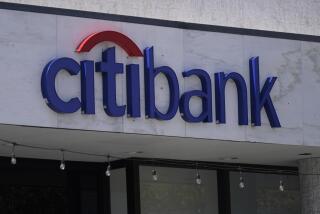Encino Bank Linked to BCCI Case Is Closed
Independence Bank, the Encino institution secretly controlled by the scandal-ridden Bank of Credit and Commerce International for six years, was closed abruptly by regulators Thursday after they determined that bad real estate loans had rendered it insolvent.
Independence, the largest commercial bank in the San Fernando Valley, is the first financial institution in the United States to fail as a direct result of its involvement in the worldwide BCCI scandal.
The closure came as a surprise because Independence recently had received a $5-million infusion under a Dec. 19 plea agreement between BCCI and prosecutors. Last week, a federal judge in Washington approved a guilty plea to criminal charges by BCCI under which the bank will forfeit a record $550 million in U.S. assets.
The plea agreement called for troubled Independence and First American Bankshares in Washington, D.C., to share a large portion of the settlement money. Independence officials hoped the capital would enable them to attract a buyer who could salvage the bank.
The bank, which had assets of about $555 million, was closed by the California Banking Department at 4:15 p.m. when state regulators took control of its Ventura Boulevard headquarters and its 13 branches throughout Southern California.
Independence was then turned over to the Federal Deposit Insurance Corp. for liquidation. About 270 employees are expected to lose their jobs.
The bank said that Independence accounts will be transferred to First Interstate Bank, which will act as an agent for the FDIC in making the funds available to depositors. Customers will have access to their money starting at 4 p.m. today and will have 60 days to withdraw their funds or convert their accounts into First Interstate accounts. Checks will be mailed to those customers who do not withdraw their money or convert their accounts.
The FDIC expects to be reimbursed for all costs related to the failure and will pay off all $530.2 million in deposits, including about $20 million in deposits that were uninsured because they exceeded the $100,000 limit for federal deposit insurance.
Nonetheless, the failure could prove embarrassing for the Bush Administration, which has been dogged by criticism that it failed to adequately monitor BCCIâs U.S. activities.
BCCI, based primarily in Luxembourg and controlled by the royal family in Abu Dhabi, was an international banking empire until authorities around the world shut it down last July. The bank has been linked to massive fraud, money laundering, drug traffickers and terrorists. Precise figures of its losses will probably never be known, although some estimates range as high as $15 billion.
Independence was one of four U.S. banks and thrifts that regulators say were secretly controlled by BCCI in recent years. The Encino bank has not been linked to any alleged criminal activities by BCCI.
Independence executives, in a statement, called the liquidation decision a surprise, adding that there had been an âimplicit understandingâ that more money would be forthcoming this year to recapitalize the bank.
State Banking Supt. James E. Gilleran cited failed efforts to obtain temporary financing until the money from the court settlement became available.
Stan Cardenas, senior deputy superintendent for the state banking department, said that Independence executives have been aware for some time that the bank is insolvent, and that it could be closed under state law. He said examiners earlier this month concluded that they had unearthed enough problem real estate loans to render Independence insolvent, prompting the decision to close it.
Independence was active in making commercial real estate loans for such projects as offices and apartments, and actively took advantage of a state law that allows state-chartered banks to dabble in real estate as investments. Independenceâs undoing came in its aggressive lending made during an expansion binge launched in the late 1980s while BCCI secretly controlled the bank. Examiners first began seeing problems at the bank in 1988. Last year, those problem loans contributed to a $44.2-million loss at Independence.
Independenceâs links to BCCI were forged in 1985 when it was acquired by Saudi tycoon Ghaith R. Pharaon for $23 million. The Federal Reserve Board last year alleged that BCCI had used Pharaon as a front man in buying the bank because federal authorities would never approve the acquisition by BCCI with its history of questionable activities.
Last November, a federal grand jury in Washington, D.C., indicted Pharaon, BCCI founder Agha Hasan Abedi and another BCCI official, Swaleh Naqvi, on charges of deceiving federal regulators in secretly acquiring the bank. All three men, who are overseas, have denied wrongdoing.
Founded 30 years ago in Canoga Park by a group of local businessmen, Independence through most of its life was a small community bank specializing in auto and real estate loans. It was sold in 1980 to a group of Far East investors, who were approached in 1984 by Pharaon representatives.
Federal records show that Independence was in fact identified as an acquisition target by BCCI officials, who had been ordered by BCCIâs founder, Agha Hasan Abedi, to find a medium-sized California bank that would add to BCCIâs growing worldwide influence.
Federal court records show that BCCI officials sent Abedi a letter that said âacquiring Independence Bank will give us much required freedom for our future growth and progress in this part of the world. The rise of (Independence) fits into the BCCI plan for acquiring a well-managed conservative financial institution on the West Coast of the U.S.A.â
Pharaon, documents show, took little interest in the bank. BCCI installed as chairman its own executive, Kemal Shoaib, who documents allege continued to receive corporate perks from BCCI, such as pension benefits and a subsidized mortgage. Federal documents say he consulted with BCCI on major issues and sent at least one job applicant to London to interview with BCCI officials.
More to Read
Sign up for Essential California
The most important California stories and recommendations in your inbox every morning.
You may occasionally receive promotional content from the Los Angeles Times.










